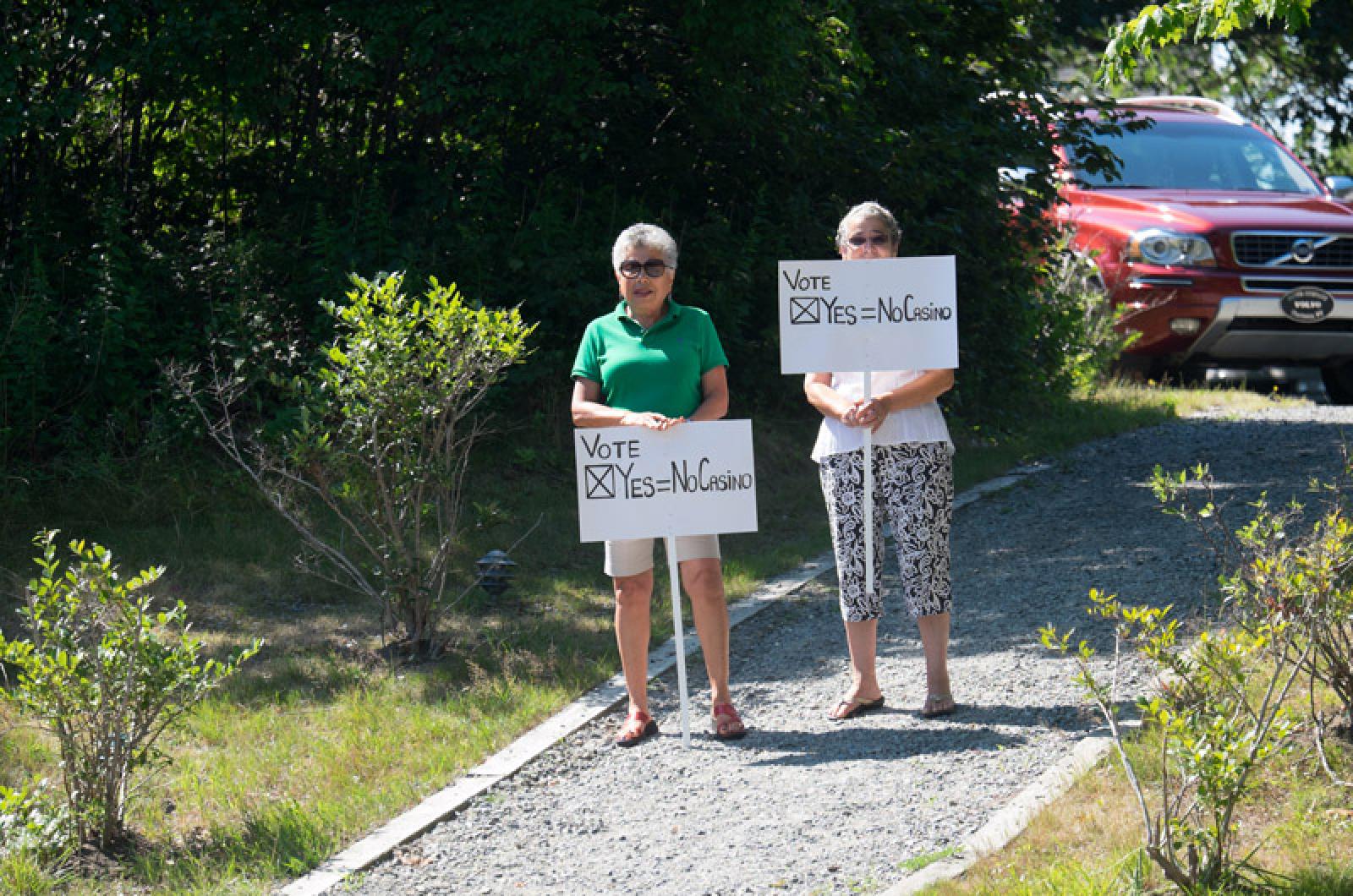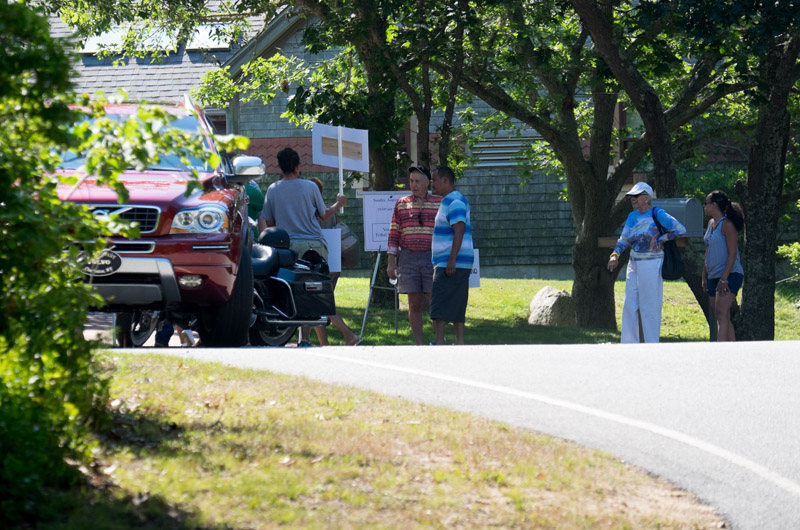A booklet circulated to members of the Wampanoag Tribe of Gay Head (Aquinnah) prior to a referendum over the latest plan to bring gaming to Martha’s Vineyard offers the first public details of what the casino might look like. When the votes were tallied Sunday, the tribe was evenly split, 110-110, well short of the two-thirds majority needed to scrap the plan.
Partly promotional, partly informational, the 21-page booklet prepared by the Aquinnah Wampanoag Gaming Corporation urges tribal members to support the casino and provides transportation information for off-Island tribal members traveling to the Vineyard for Sunday’s vote.
Illustrated by computer-generated renderings and charts, the booklet describes the potential benefits in jobs and money of the planned 9,000-square-foot casino, referred to in pictures as Aquinnah Cliffs, and efforts to make it fit in with the Island aesthetic.
It also frames the tribe’s efforts since 2010 to develop a casino on tribal lands as an issue of tribal sovereignty, noting that tribal members voted four times in 2012 and again in 2014 to convert an unfinished community center to a class-II gambling facility, essentially a bingo hall. It sharply rebukes efforts by the town and the state to prevent gaming in Aquinnah.
“The Wampanoag Tribe of Gay Head (Aquinnah) is a sovereign nation existing thousands of years before our Island was invaded,” the booklet says in part. “Aquinnah possesses the sovereignty inherent in all tribes and sovereign governments to make our own decisions without interference from or enforcement by any state or town entity.”
An introductory letter is signed by gaming corporation members Cheryl Andrews-Maltais, Naomi Carney, Keith Marden, Steve Craddock and Tobias Vanderhoop. Mr. Vanderhoop is also the tribal chairman.
Earlier this summer, tribal opponents of the casino had petitioned for the tribe to vote again about whether to proceed with the casino plan. Over the course of four hours on Sunday, 228 of the tribe’s 1,289 members converged on the tribal building on Black Brook Road in Aquinnah to cast ballots. A large number arrived in vans and buses from various locations on the mainland.
The tribal council in Aquinnah does not collect statistical data on voters, so it is difficult to know how many voters were from off-Island. But former tribal chairman Beverly Wright, who is against the casino plans, believes the most of the voters in favor of the project were from off Island. “I would say it was evenly split, on-Island and off-Island,” she said after the count on Sunday. “I think the Island voters really came out to say what they wanted.”
Before the final vote was announced, tribal officials said they were conducting a recount. Eight votes were disqualified due to nonconformity. A similar ballot measure in 2014 had failed by two votes.
“The will of our citizens, based on the result of today’s vote, is that there will be no change to [the] present course of the tribe,” Mr. Vanderhoop said in an email Sunday evening.
Prior to the vote, Ms. Wright and others had worked to mobilize tribal members against the project. “We sent out letters, we called, we spoke to every member that we saw,” she said.
Ms. Wright said Monday that a list of concerns had also circulated among tribal members prior to the vote, drawing attention to issues related to traffic, sewage, lighting and security for tribal housing. “We have 50 children living within 500 feet of the casino road,” she said.
While opponents of the project have been vocal this summer, supporters have been mostly silent, at least publicly.
The booklet, obtained by the Gazette after the vote, however, lays out the case for a Vineyard casino in detail. It notes that the tribe had initially focused its efforts on the mainland, but then turned to the Island option when those efforts were spurned by the state. The booklet also trumpets the economic benefits of a casino, both in overall revenue and jobs, and described a facility “designed to complement the aesthetic of the Island.”
According to the booklet, the class-II slot parlor will be 9,000 square feet, about a third larger than the existing unfinished community center. The expanded facility would have about 300 gaming machines in a “light and airy” atmosphere. Visitors will be greeted by a circular drive and stone walking paths around the property. The interior would make use of natural light, wood laminates and other earth-tone materials intended to mirror the outdoors.
“Since Island visitors spend a significant amount of their time outdoors, the intention is to create an interior comfort level for patrons that will promote a feeling of relaxation and support longer patron play at the property,” the booklet says.
Meanwhile, the legal case over whether the tribe has the right to build a casino remains pending in U.S. District court. Three weeks ago, the Hon. F. Dennis Saylor 4th, the federal judge presiding over the case, granted a court order that temporarily halts any work on the community center conversion project. Arguments in the case were heard by Judge Saylor in Boston last week. He has not yet issued a ruling.
At issue from the town and state’s perspective is whether the Indian Gaming Regulatory Act of 1988 (IGRA) supersedes a land settlement agreement between the town and the tribe, which was later enshrined in state and federal law.
The booklet, however, treats the issue like settled law, citing an opinion from the Department of the Interior’s Office of the Solicitor that Aquinnah settlement lands are eligible for gaming.
“By constructing a class-II bingo hall, the tribe’s only interaction would be with the federal government, eliminating the state, with their highly prejudiced and patently biased actions that were being taken against the tribe,” it says.
A feasibility study by the research firm Klas Robinson QED as described in the booklet estimated that a casino in Aquinnah would generate gross revenues of about $12.7 million in the first year, with net revenues of about $4.5 million, increasing in subsequent years. A total of 100 to 130 jobs would be created with an annual payroll of more than $2.5 million, the booklet also says. Jobs would be made available first to tribal members. “It is widely acknowledged that a gaming facility will generate indirect employment opportunities that are at least equal to the number of positions at the property,” it also said.
An expert on gambling interviewed by the Gazette earlier this month offered a far lower estimate about how many jobs would be created by a class II casino. Dr. Clyde Barrow, formerly of the University of Massachusetts-Dartmouth, said casinos with electronic bingo are so automated now that only one or two jobs are created for every $1 million in revenue.
The booklet highlights the growing revenue of tribal gaming nationwide, from $5.4 billion in 1995 to almost $28.5 billion in 2014, and suggests that gaming revenue would allow the tribe to advance key initiatives such as cultural resource protection, programs for tribal elders and youth, health care services, education, housing and job creation.
Former tribal chairman Donald Widdiss said Monday that those arguments miss the point. “It wasn’t really clear how that pertains to here,” he said. “As most of us are aware, there are overwhelming problems in terms of existing federal legislation, which limits our ability to game, and lots of regulatory issues with not only the town but the [Martha’s Vineyard Commission] and other towns and the state.”
Mr. Widdiss argued that a casino itself was less of a problem than the fraying of town-tribe relations it could bring about. He said that issue has not been adequately addressed by tribal officials.
But Mr. Vanderhoop the tribal chairman, and others say the majority of tribal members have repeatedly endorsed the plan. And supporters have expressed confidence that IGRA will open the door to a casino on the Island.
In the booklet’s introductory letter, the gaming corporation wrote: “We each have a responsibility to ensure that the action taken by the tribe truly reflects the will of ALL of our tribal members, not just a few.”








Comments (15)
Comments
Comment policy »